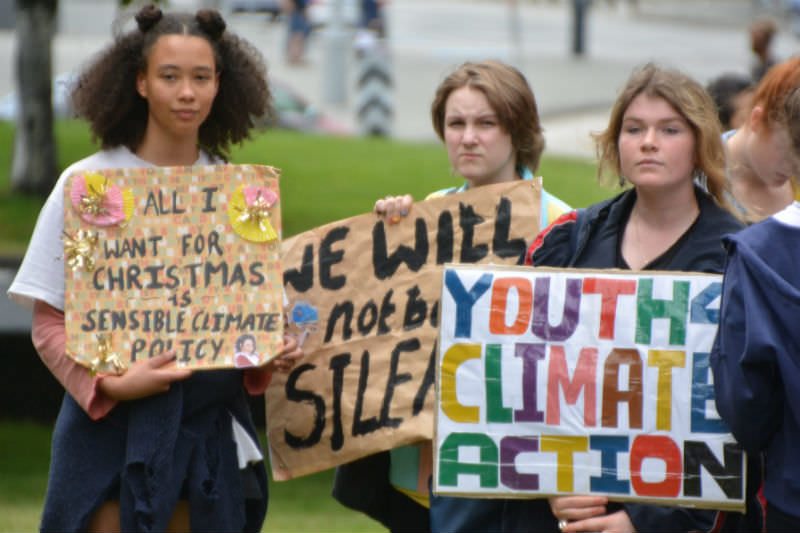Extract from Eureka Street
- Home
- Vol 29 No 5
- Children speak truth to climate inaction
- Cristy Clark
- 13 March 2019
When I was a young child, I had nightmares about Ronald Reagan. I was terrified he was going to start a nuclear war and destroy us all.

People often laugh when I recount this tale. To many it seems funny, almost cute. Others have described my fears as the product of a childish imagination or parental brainwashing. But the fact is that nuclear war was a genuine possibility. The world was not in safe hands.
Although I was lucky enough to have parents who took my agency seriously, the most overwhelming and depressing aspect of that experience was how little my fears counted. As a child, I had no power and very little voice, despite the fact that the adults in charge were risking our very survival.
Fast forward 35 years, and my own children are faced with a similar predicament in relation to climate change, but now there is a crucial difference: it's not a genuine possibility, it is a reality. We are already changing the climate and creating devastating changes to the planet. The only question that remains is how devastating will these changes become? How many ecosystems will collapse? How many rivers will run dry, species die out, diseases spread, famines ravage, wars rage?
Do you ever lie awake in bed and wonder how this could have happened? How did we let it happen? And why are we not marching in the streets in sheer fury at the vested interests who have sealed our fate? Greta Thunberg has. At the age of eight, she learned about climate change and struggled to understand why serious action was not number one on the global agenda.
'If burning fossil fuels was so bad that it threatened our very existence, how could we just continue like before? Why were there no restrictions? Why wasn't it made illegal? To me, that did not add up. It was too unreal.' By the age of 11, Thunberg says she was so overwhelmed and depressed by what was happening to our planet, and her sense of powerlessness to stop it, that she stopped eating and talking.
Then, last August, at the age of 15, she decided to take action. Greta refused to go to school and, instead, sat herself down in front of the Swedish Parliament to demand action on climate change. She was alone for just one day. This Friday, the School Strike 4 Climate Action will go global for the second time. Children in at least 1209 places across 92 countries are planning to walk out of school to protest the lack of real action on climate change.
"Describing the issue of climate change as ‘complex' is a deliberate ploy to continue to marginalise the voices of those with the most at stake. Children are particularly good at seeing through this kind of obfuscation."
Predictably, people have responded by arguing that these children have been brainwashed — that they are ‘being used as pawns'. Public relations executive Gemma Tognini has mocked children for ‘'demanding action' on an issue that the world's most educated voices can't reach agreement on.' But, as Thunberg has so eloquently pointed out, educated voices have reached agreement — ‘the climate crisis has already been solved. We already have all the facts and solutions.'
What Tognini probably meant to say was that the world's most powerful voices — politicians and the vested interests they answer to (aka, her PR clients) — can't reach agreement. In fact, they have little incentive to act and a lot invested in maintaining the status quo.
In contrast, children have a particularly strong incentive to demand change. Not only is it their future that we are destroying, but children are especially vulnerable to the impacts of climate change. And these physiological and psychological vulnerabilities to climate change are exacerbated by their exclusion from decision-making processes.
Describing the issue of climate change as ‘complex' is not just a cynical way of avoiding the truth, it is deliberate ploy to continue to marginalise the voices of those with the most at stake in this debate. But children are particularly good at seeing through this kind of obfuscation — particularly those, like Greta, who are on the autism spectrum.
On Friday, my children will be walking out of school. My eldest says she wants 'to protest that some of the adults should actually do something about this planet that is dying, because we're all going to die with it'. Like Greta, she sees climate change action as a pretty black and white issue. 'I think it is important to save the planet and not just think about money and power.'
When we contacted their school to let them know that our children would be leaving early on Friday, they responded encouragingly and said they 'love civic engagement and for children's voices to be heard ... It's their planet after all.'
I'm glad that children across the world are being heard too, but honestly this should never have been their burden to bear.
 Dr
Cristy Clark is a lecturer at the Southern Cross University School of
Law and Justice. Her research focuses on the intersection of human
rights, neoliberalism, activism and the environment, and particularly on
the human right to water.
Dr
Cristy Clark is a lecturer at the Southern Cross University School of
Law and Justice. Her research focuses on the intersection of human
rights, neoliberalism, activism and the environment, and particularly on
the human right to water.
No comments:
Post a Comment